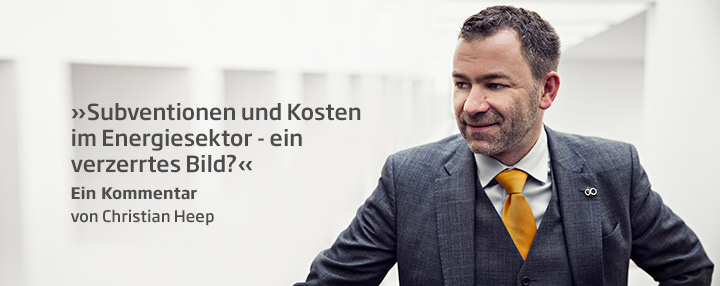
Straight talk meets facts / Subsidies and costs in the energy sector – a distorted picture?
– a commentary by Christian Heep
The world is at a decisive turning point. The cumulative effects of the climate crisis, rapid resource consumption, social inequality and global environmental degradation are jeopardising not only our natural resources, but also social stability and geopolitical security. These factors are not only destabilising the economy and society, but are also driving political polarisation.
We are experiencing a time in which scientific findings and technological advances are coming up against political hesitation and economic inertia. The crucial question is: how can we manage to integrate the urgently needed changes into our economy, politics and society in a consistent and sustainable manner?
The green economy is the key to this transformation. It combines economic growth with environmental compatibility and social justice without exceeding planetary boundaries. However, the transition from fossil-fuelled, inefficient structures to sustainable value chains requires decisive action at all levels. It is no longer enough to formulate climate targets and hold out the prospect of long-term strategies. Instead, measures must be taken now to initiate and further promote the necessary systemic changes.
In recent decades, the narrative has often been spread that market mechanisms and technological progress alone would bring about the necessary changes. In reality, however, politicians have intervened deeply in the market through massive fossil fuel subsidies for oil, coal and gas as well as state subsidies for nuclear energy, sometimes directly, sometimes through state guarantees for liability risks or through the financing of the search for final storage sites and decommissioning costs – with the difference that these interventions have never been scrutinised. While the promotion of renewable energies has been discredited as an artificial distortion of the market, fossil fuel subsidies have always been regarded as ‘economically necessary’ or ‘securing the location’. This double standard has led to climate-damaging technologies being favoured for decades, while sustainable alternatives have been systematically disadvantaged.
Anyone who really takes a critical view of subsidies should first end the subsidies for fossil fuels – before questioning the support for renewables. But that is exactly what is not happening – instead, renewable energies are being deliberately slowed down while the fossil fuel industry continues to receive billions in support.
There are only two sensible ways to promote renewable energies – provided that politicians support this decision, which they have already done with the existing subsidies for renewables. Either fossil fuel subsidies are phased out, thus ensuring fair competition, or renewable energies are subsidised to the same extent in order to create a balance. History shows that the state can indeed have a serious steering effect. However, if it steers in both directions at the same time – continuing to subsidise fossil fuels and supporting renewables at the same time – we are treading water because the opposing incentives neutralise each other.
There are only two sensible ways to promote renewable energies – provided that politicians support this decision, which they have already done with the existing subsidies for renewables. Either fossil fuel subsidies are phased out, thus ensuring fair competition, or renewable energies are subsidised to the same extent in order to create a balance. History shows that the state can indeed have a serious steering effect. However, if it steers in both directions at the same time – continuing to subsidise fossil fuels and supporting renewables at the same time – we are treading water because the opposing incentives neutralise each other.
We are faced with a choice: either we actively shape the transformation and benefit from the economic and social advantages – or we miss the opportunity and are overwhelmed by the negative consequences. A ‘business as usual’ approach will inevitably lead to an economic and ecological dead end categorised as multiple organ failure, while a consistent shift towards a green economy can be established as the basis for a new, sustainable model of prosperity. However, this scenario is countered by a grotesquely persistent narrative: renewable energies are fundamentally more expensive than fossil energy generation and can only exist on the market at all thanks to high subsidies.
A purely economic analysis is sufficient to clearly recognise the enormous cost advantages of renewable energies in terms of electricity generation costs.
- Solar and wind power are already by far the cheapest energy sources today. According to the International Energy Agency (IEA), the electricity generation costs of solar and wind energy have fallen dramatically in recent years. Photovoltaic systems now generate electricity for less than 5 cents per kWh in many regions – without fuel costs or price risks due to geopolitical conflicts. Onshore wind energy is also well below the cost of new coal or gas-fired power plants at around 4-6 cents per kWh.
- Fossil fuels are expensive. The cost of fossil fuels is not only higher, but also heavily dependent on geopolitical uncertainties. For example, gas prices fluctuated by several hundred per cent in some cases after the war in Ukraine, making energy supplies massively more expensive.
- Nuclear power is an economically obsolete model. New reactors generate electricity for 12-16 cents per kWh – more than twice as expensive as wind or solar power. Added to this are the billions in costs for construction, dismantling and final storage, which are almost always borne by the state.
Not to mention the positive effects of clean and sustainable energy generation:
- Renewable energies reduce air pollution and health costs. According to the WHO, millions of people die every year as a result of air pollution caused by fossil fuels. A complete switch to renewable energies could drastically reduce this figure.
- Sustainable energy sources create stable and independent supply systems. Countries with a high proportion of renewable energy are far less dependent on fossil fuel imports, which strengthens their economic resilience. In 2022 alone, Germany paid around 177 billion euros for fossil fuel imports, mostly to geopolitically unstable regions – funds that could instead be invested in building domestic value creation.
- A decentralised energy supply minimises grid losses and increases security of supply. Renewable energy generation plants can generate electricity directly where it is needed – without long transport routes and therefore without high grid losses.
Renewable energies therefore have considerable advantages for climate and environmental protection as a side effect, so to speak, and make a decisive contribution to long-term security of supply.While fossil fuels continuously cause environmental impact costs as well as costs for fuel, transport and disposal, the situation is different with renewable energies. As soon as wind, solar, biomass, geothermal or hydropower plants are installed, they produce electricity at almost no additional cost. The US economist Jeremy Rifkin describes the zero marginal cost theory in this context: in theory, the marginal costs of energy production could approach zero – if politicians set the right framework conditions.
Actual figures instead of myths
Figures from official sources clearly show how heavily fossil fuels are subsidised – while renewables are often wrongly portrayed as a cost factor.
Fossil fuels (oil, coal and gas) are massively subsidised worldwide – both directly and indirectly. According to calculations by the International Monetary Fund (IMF), around USD 7 trillion (approx. EUR 6.4 trillion) in subsidies were channelled into fossil fuels worldwide in 2022. Around USD 1.3 trillion of this was accounted for by direct government subsidies; the rest is made up of follow-up costs due to environmental pollution, health risks and climate damage (IMF, Statista, 2023).
Nuclear energy is also supported worldwide by substantial state subsidies – both directly and indirectly. However, it is difficult to determine a global total, as subsidies vary greatly from country to country. In Germany, state subsidies for nuclear energy totalling 210 billion euros (nominal) or 287 billion euros (adjusted for inflation to the 2019 price level) were provided between 1955 and 2022. This sum includes direct financial aid, tax concessions and other indirect subsidies (Forum Ökologisch-Soziale Marktwirtschaft FÖS, 2020).
However, these are only direct and in some cases indirect subsidies. The actual costs of nuclear energy to society as a whole are far higher, as they also include external costs such as environmental and health damage as well as the long-term costs of dismantling and final disposal of nuclear waste. According to estimates, these costs could exceed the amounts originally stated many times over (FÖS, 2020).
By comparison, total government subsidies for renewable energies amounted to just USD 500 billion in the same period – this corresponds to less than 7 per cent of fossil fuel subsidies, even though they are more sustainable and environmentally friendly. This underlines the need for a reassessment of subsidy policy in favour of a sustainable and climate-friendly energy supply. And yet: despite considerable resistance, we have already achieved a share of renewable energies of over 50 per cent of electricity generation – the transformation could, however, have progressed considerably further if targeted blockades and delaying tactics had not systematically hindered its implementation.
External costs – the hidden subsidies of fossil fuels
Fossil fuels often appear cheaper at first glance because many of their actual costs do not appear on the electricity bill. For a long time, on the other hand, the costs of renewable energies were recognised directly by the consumer, which gave the impression that they were more expensive – while the hidden costs of fossil fuels were borne by the general public through taxes. In plain language: they were visible on the electricity bill, while the fossil fuel costs remained hidden.
For years, this lack of transparency sent the wrong signals to the population. This distortion was only partially corrected with the abolition of the EEG surcharge in July 2022. Since then, the promotion of renewable energies has been financed from the federal budget instead of being recognised directly on the electricity bill (netztransparenz.de, 2022).
And although the figures speak for themselves, fossil fuel expansion plans, a questionable revival of nuclear power and other energy policy fairy tales that contradict all the facts – completely detached from economic and scientific realities – continue to get caught up in many political debates and at the regulars’ tables in Germany. It is remarkable that politicians and parties who advocate this fossil-fuelled course hardly ever cite the economic and financial facts, but continue to rely on outdated narratives.
However, since no one can seriously assume that the actors in government and parliament are all uneducated or resistant to facts, the only conclusion that remains is that they are following a different agenda – a climate-driven industrial policy that prioritises fossil interests over the needs of the country and its citizens. This is an energy policy tragedy whose effects and costs will have to be borne by future generations – and which is unacceptable from an economic, ecological, social and societal perspective.
The fundamental problem remains:
- The billions in indirect costs of fossil fuels, such as environmental and health damage, remain hidden outside the electricity bill.
- Subsidies for fossil fuels are largely handled via tax breaks, support programmes and financial aid – not directly visible to the population.
- Pricing on the electricity market continues to be based on the most expensive forms of generation (merit order principle), which puts renewable energies at a structural disadvantage.
The abolition of the EEG levy has already helped to reduce energy costs for consumers. However, one decisive step is still missing: decoupling the price of electricity from the price of gas. Only when the price of electricity is no longer dictated by expensive fossil-fuelled power plants will the real cost benefits of renewable energies actually reach people.
The problem is not that renewable energies are actually more expensive – but that the cost structures remain distorted and the more favourable form of energy does not reach the consumer, thereby damaging public acceptance of the energy transition. Fossil fuels continue to benefit much more from hidden subsidies and externalised costs that do not appear transparently in the market price but are borne indirectly by the general public.
Influence of fossil interests
Research by LobbyControl has uncovered links between the fossil fuel industry, the global financial investor KKR, until recently the main shareholder in Axel Springer SE, the parent company of BILD and DIE WELT, and conservative think tanks such as the Atlas Network, which potentially influence politics and the media (LobbyControl, 2023).
The Atlas Network is an international network of almost 600 radical market think tanks that spreads conservative and neoliberal narratives worldwide. In the past, some of its partner organisations have specifically opposed climate protection measures and actively campaigned for an extension of the use of fossil fuels (Wikipedia, 2023).
In addition, the Cato Institute and the Heartland Institute are two well-known think tanks that have been financed with fossil fuel money and have been deliberately sowing doubt about climate change for decades – with studies that have long been scientifically refuted.
Recommended reading
Prof Christian Stöcker provides a detailed analysis of the mechanisms behind the fossil fuel interest groups in his book Männer, die die die Welt verbrennen: Der entscheidende Kampf um die Zukunft der Menschheit – Profiteer der fossilen Brennstoffe versus Erneuerbare Energien im Zeichen der Klimakatastrophe (2024). It reveals the strategies used by fossil fuel lobbyists to block change and the crucial role played by disinformation.
Conclusion: The future is renewable!
We have therefore established that only a fraction of the subsidies flow into renewable energies. Nevertheless, this verifiable fact is constantly ignored in political and social debates. However, a fair cost calculation shows that renewable energies are not only ecologically but also economically the far better choice and will clearly lead to falling energy prices in the long term. Every euro invested in renewable energies pays off several times over – ecologically, economically and socially.
The future is in our hands. Support those who are committed to real climate protection, a sustainable economy and a secure energy supply. The 2025 federal election is a turning point – let’s use this opportunity to set the right course.






